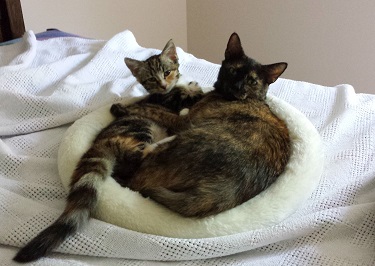“Make that change.”
– Michael Jackson, “Man in the Mirror”
Look, the new kitten has jumped up on the lap pillow where I am holding my cat! Will the cat make room?! The kitten has plunked herself beside the cat, their long bodies side by side. I am in heaven – a two-cat lap! I lean over and put my face against their fur, taking in a deep breath of love for them, and feel a slight something in my chest, not quite a burning. What is that? I should exhale, then inhale again. Scanning… I feel it again! Was I able to inhale as much air this time? Oh, no, am I allergic to the new kitten?! Maybe I’m allergic to two cats?! What have I done by adopting a second cat?! Will I have to give the kitten away? What will I tell the friend from whom I adopted her – that I didn’t love her enough to keep her?! People will think I’m stupid and weak if I’m allergic to cats and still keep them! If I keep the cats, will my lungs become so inflamed that I will be unable to breathe? Will I die here, suffocating, alone? The cats will cry and cry and no one will help them! Who will care for the cats?!
These were my thoughts. I had them, they distressed me, I became conscious of my thoughts and distress, I offered myself different thoughts, and soothed my upset self.
A conscious process
Even learning that such a conscious process exists, much less learning to perform it for myself, has taken decades. I can sometimes do it seamlessly and quickly. Sometimes, before I am conscious of my inner state and can comfort myself, I have done something that harms me – given myself a headache from crying so much, eaten an entire bag of chips – or harmed my relationships with others because I have shared the limitless enormity of my distress and I have overwhelmed my friend, my family member, my colleague or partner.
Consequences of “catastrophizing”
My thoughts are an example of “catastrophizing,” the term given by Albert Ellis to a series of anxious thoughts that may make sense to a person internally, but are irrational when examined objectively. The thoughts escalate, increasingly approach a “worst case scenario,” and increasingly alarm the thinker. People who have challenges with self-regulation – a particular interest of mine because of its importance to addictions treatment – often “catastrophize.”
(I had the amazing good fortune for my name to be chosen from a fish bowl at a continuing education seminar for a one-on-one demo session of Rational Emotive Behavior Therapy with its founder, Albert Ellis, in Tampa, Florida in April, 2003. I think he was 90 at the time. He identified my “catastrophizing” pretty much instantaneously, but he was very kind. He died just 4 years later.)
I felt sad when I transcribed my cat thoughts. I feel regret and compassion for the part of me that thinks such upsetting thoughts. I suffer, and others can suffer, when it happens. I work on the why and how and I make progress. But I’m still sorry.
Enough! My plan is sublime happiness!
Consciously making that change
I believe that through consciousness and self-awareness, I and you and we can make changes.
Self-soothing cat thoughts: Anne, you have lived with one cat or two cats since you adopted your first cat in 2002. You still breathe! And if the worst case scenario happens? You have named in your will the beneficiary who will care for your cats. Right here, right now, it’s all okay. Anne, take a restorative, calming breath. Embrace your cats and your love for them.
Onward!



Very good Anne. just have good day.
Thank you so much, Danny! I so appreciate you leave a comment!
I can totally relate with your thought process. I tend to do that a lot and am constantly trying to learn to offer myself different thoughts. It’s so hard. I often end up just making myself sick and stressed. :-/
And I can relate to yours! “I often end up just making myself sick and stressed. :-/” Perfectly put for me, too. Thank you so much for sharing this!